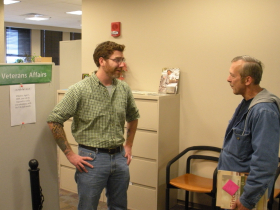
Donna Lawson said she felt like “a duck out of water” when she stepped foot onto Sinclair Community College’s campus, but with the help of the Veteran’s Assistance (VA) office the transition was easy.
“The folks at the VA office are great,” Lawson said.
Lawson spent 28 years in the Air Force and began her college career this past fall. Lawson pays for her schooling with the G.I. Bill. The G.I. Bill “provides benefits to veterans, service-members and some dependents of disabled or deceased veterans wishing to pursue an education,” according to www.gibill.va.gov. Veterans are required to pay into their G.I. Bill and are able to access them with the help of the VA office, as well as other resources. If veterans aren’t eligible for the G.I. Bill, the VA Office will try to help them in other ways, said Jimmy Ryan, a veteran of the U.S. Navy who works in the VA office through a work-study program. Ryan used the VA office to help him start his schooling.
“The whole goal of this office is to help [the veterans] be successful at Sinclair,” Ryan said.
Mary Strong has been coordinator for the VA office at Sinclair for 11 years. Strong described the VA office as a place where veterans can find help with any of their queries.
“It’s like a one-stop shop. This is a place where [veterans] don’t need an appointment,” Strong said. “They can come here and get all their needs met.”
From Vet to College Student
Rhoda Salinas was in the Air Force for more than 13 years and will begin her journey at Sinclair in the spring. Salinas said she joined the Air Force because she wanted to explore the world.
She was stationed in Mississippi, California, South Korea and Iraq during her time in the Air Force. Salinas attended Sinclair for a year before joining the Air Force.
“[The military] always encourages you to go back to school. That’s one thing for sure,” Salinas said.
Lawson said with her background in the Air Force the transition to doing college work has been easy.
“The military has given me a lot of structure in my life,” Lawson said.
Lawson felt that the biggest difference between the Air Force and civilian life was deciding what to wear on a day-to-day basis.
“You get up one day and all of a sudden you don’t have to wear a uniform anymore,” Lawson said. “I now had to have a wardrobe, which I never used to have.”
Ryan said the transition from being in the Navy to being a college student was different.
“Organization was the hardest transition for me,” Ryan said.
He said what helped with his transition were skills he learned in the Navy, like the attention to detail and the critical thinking. He was also surprised at the amount of time he had on his hands.
“You get a lot of free time,” Ryan said.
He used his free time to join different organizations on campus.
Strong said the discipline from the military equips the veterans with the energy to be successful students at Sinclair.
“These folks are very serious about their educational goals,” Strong said.

